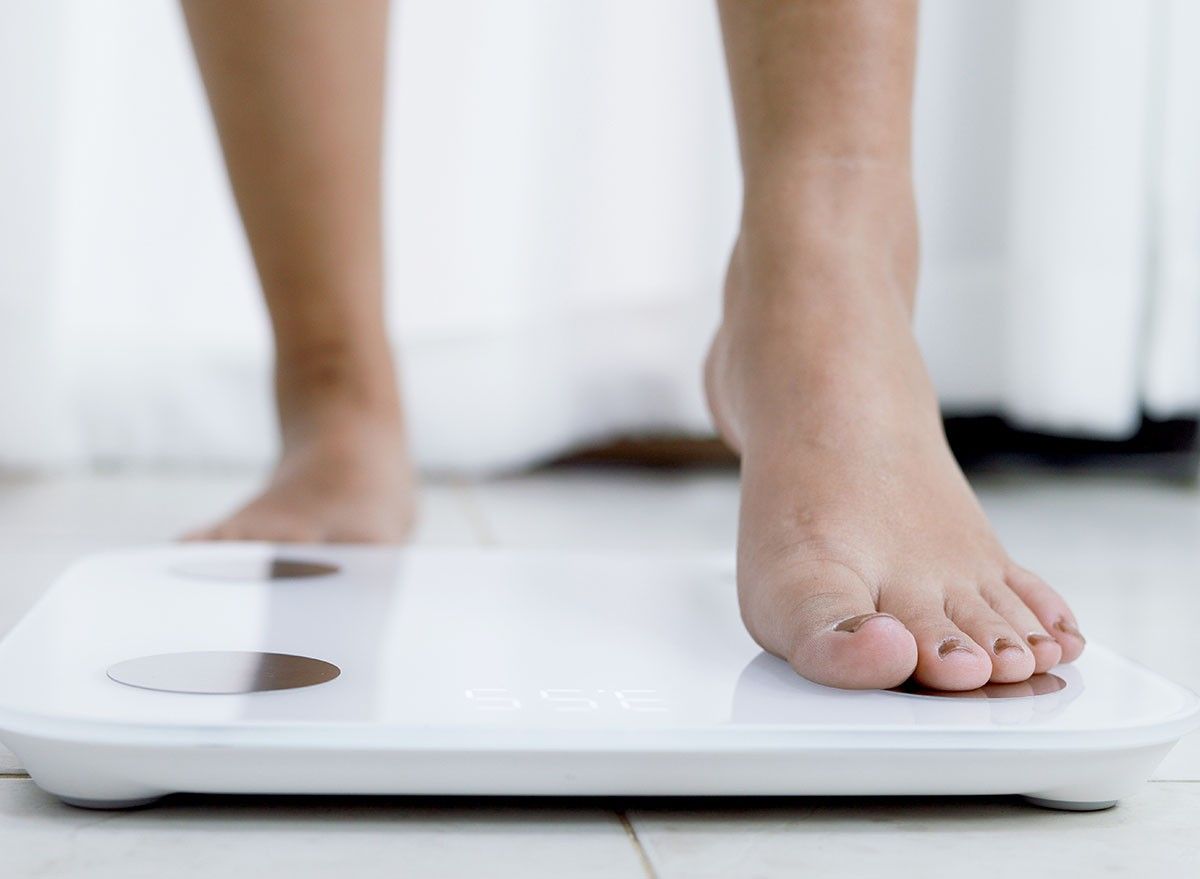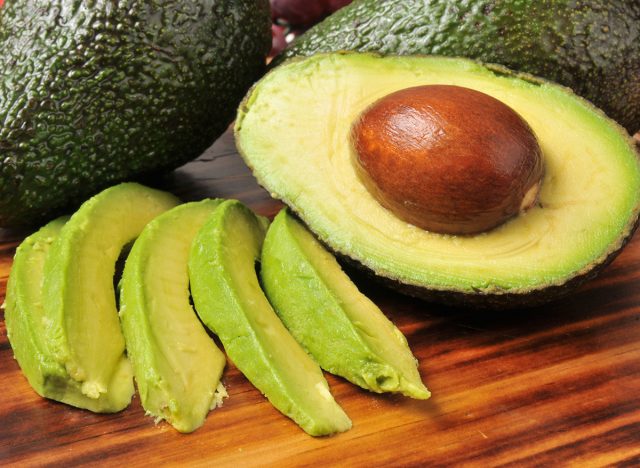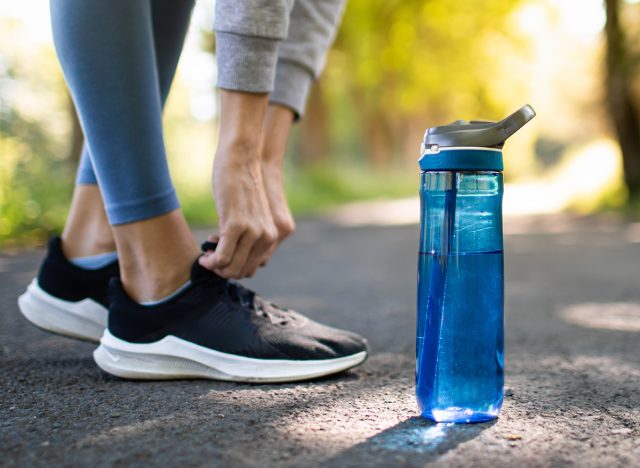This Plan Is How to Lose 5 Percent Body Fat In 2 Weeks

Want to lose 5 percent body fat in two weeks? And what does that mean exactly? The aim for a 5 percent reduction in body fat means striving to lose 5 percent of your total body fat while maintaining a healthy weight. This goal is often set because even a modest reduction in body fat can have significant health benefits.
Body fat percentage is a measure of the proportion of your body weight that comes from fat tissue. It's different from just looking at overall weight because it takes into account your body composition.
Reducing body fat by 5 percent can lead to improvements in various health markers, such as reducing the risk of chronic diseases like heart disease and type 2 diabetes. "Symptoms associated with obesity, diabetes, high blood pressure, and cholesterol levels can often be alleviated just by reducing weight," says Blanca Garcia, RDN. It can also enhance your overall well-being, boost energy levels, and improve physical performance.
It's a realistic and achievable goal that, when combined with a balanced diet and regular exercise, can contribute to a healthier lifestyle. That said, the two week timeline can be detrimental to your health. "A 5% body fat loss in two weeks is not a recommendation I would do. The healthier, more achievable goal is to make lifestyle changes that are small but doable. Once the body and the individual person are in harmony with this change, another change can be considered," says Garcia, and I agree. Read on to see how to lose weight relatively quickly, but safely and sustainably.
Is it Physically and Healthily Possible to Lose 5 Percent Body Fat in Two Weeks?

It is possible, but I won't say it is healthy, to lose 5 percent body fat in two weeks. Rapid weight loss, including body fat loss, is often associated with extreme measures that can be detrimental to health, says one report.
"Although as tempting as it may seem to want to lose fat very quickly, slow and steady is safer for the body," says Garcia. "Rapid weight loss usually means starving the body of nutrients, all that will do is deplete nutrients from tissues and bone, and as soon as the person starts eating again, all the weight comes back. It's common to hear from clients that quick weight loss hasn't worked for them, they lose the weight, are happy, and go back to eating the same way they did before and it all comes back.
Weight loss that is sustainable for the long term requires changes that are lifelong and can only be sustained if those changes are something a person can actually do."
She continues: "Setting overly ambitious goals with physical activity can lead to injury, but also can have feelings of despair if the goals are not met. That is why when discussing goals, they should be something attainable that won't require extreme measures."
A safe and sustainable rate of weight loss is generally around 1-2 pounds per week. A reasonable target for many individuals is around 0.5% to 1% body fat reduction per week. Losing weight too quickly can lead to muscle loss, nutritional deficiencies, and other health issues. Also, sudden and drastic changes to diet or exercise routine may not be sustainable in the long run.
I recommend approaching weight loss in a balanced way, focusing on a combination of a healthy, calorie-controlled diet and regular physical activity. Crash diets or extreme exercise regimens can put stress on your body and are unlikely to result in long-term success. With that in mind, here are some key principles of healthy fat loss.
Key Principles of Healthy Fat Loss

The key principles of healthy fat loss include:
Calorie Deficit: Weight loss generally requires a caloric deficit, meaning you consume fewer calories than your body needs. This can be achieved through a combination of reducing calorie intake and increasing physical activity.
Macronutrient Split: Balancing macronutrients can help optimize energy levels, support muscle maintenance, and contribute to a feeling of fullness, which can aid in controlling calorie intake. The specific ratio of macronutrients can vary based on individual needs, preferences, and goals.
Physical Activity: Both cardiovascular exercise and strength training matter. Cardio helps burn calories, while strength training helps preserve and build muscle mass, contributing to a healthier body composition.
Hydration: Drinking an adequate amount of water throughout the day is also important. Sometimes, the body can confuse thirst with hunger, leading to unnecessary calorie consumption.
Sleep: Lack of sleep can affect hunger hormones and lead to increased food cravings, making it more challenging to stick to a healthy eating plan.
Consistency: Healthy fat loss is a gradual process. Stay consistent with diet and exercise habits is the key. Rapid weight loss is often unsustainable and can have negative health consequences.
Working With Professionals: It's always best to consult with healthcare professionals to ensure the approach is safe and tailored to individual needs.
How to Achieve Rapid Fat Loss in a Way That is Safe and Sustainable

It's possible to achieve relatively rapid fat loss, just like I said above, but doing so in a way that is both safe and sustainable may be difficult. Extreme measures, such as very low-calorie diets, excessive exercise, or drastic changes in lifestyle, can lead to negative health consequences and are often difficult to maintain in the long term.
To make it safe, continuous and meticulous monitoring has to be done. There is a need to keep an eye on overall health, including energy levels, mood, and any signs of nutrient deficiencies. The healthcare professional may recommend supplements to fill nutrient gaps but this should be done under supervision, as excessive supplementation can also pose risks.
"Rapid weight loss can be achieved in a safe and sustainable manner through direct work with a doctor and registered dietitian," says Garcia. "When morbidly obese, it's possible to lose weight rapidly under the supervision of these two professionals. This is usually through some type of gastric bypass or weight loss with medication. Most times however, these rapid weight loss situations need protein, vitamin and mineral replacement as the body does not receive it in enough quantities through food."
Sustainability may not be reached here as losing 5 percent body fat in 2 weeks, itself, is already a short-term goal. Ideally, gradual transitioning to a more balanced and sustainable eating plan after achieving short-term goals should be done.
Dietary Strategies for Fat Loss

Diet-wise, prioritize nutrient-dense foods to ensure the body of getting essential vitamins and minerals. Include a variety of fruits, vegetables, lean proteins, and whole grains. Protein intake, particularly, is essential to help preserve muscle mass, especially during calorie restriction. Include lean protein sources in the diet with the right ratio to the total caloric requirement and health needs. Last but not least, adequate hydration is also crucial, therefore it is best to drink plenty of water to help maintain proper bodily functions and prevent dehydration.
Small changes can lead to big results. "To lose fat in a healthy way you need to take an inventory of what you eat, identifying foods that you can avoid already automatically helps lower caloric intake that was unnecessary," says Garcia. "A good example I often use with clients is the consumption of coffee—by reducing a large cup of coffee with milk and sugar to a small cup, it can reduce the beverage by 100 calories. That is about 700 calories per week."
She continues: "Strategies to support healthy fat loss are:
- The increased consumption of monounsaturated fatty acids and polyunsaturated fatty acids, these are the good fats that are typically found in nuts, seeds, beans, legumes, and avocado.
- The fastest way to lose body fat—and do it safely—is to eliminate highly processed foods, like fast foods, pre-packaged foods, pastries, sugary beverages. All of these foods contribute to significant amounts of saturated fats and simple sugars that are stored as fat.
Exercise and Reducing Body Fat

"Exercising really contributes to the reduction of fat loss as the body starts to use its stores of fat for energy," says Garcia. "Any excess sugars are converted to fat in the liver and stored in the body. Therefore, when exercising for extended periods of time in low-intensity type of exercises, the body goes into aerobic mode and begins to use up the stored fat for energy and can be a way to use up some of that fat."
Garcia adds: "A low-impact physical activity like walking, jogging, swimming, cycling is the preferred method for fat loss. The higher the intensity gets the energy sources switch to rapid use of sugar stored in the blood and glycogen stored in the muscles.
When recommending physical activity to clients I always encourage them to first consult with their doctor about their limitations with physical activity based on their medical conditions.
If a client really wants a recommendation, I usually encourage 30 minutes daily of just walking. They can do it all at once or break it down to two 15-minute sessions. This is usually the case because most clients have medical conditions or physical limitations that can affect their ability to do more.
Most people are sedentary and need to have realistic expectations about their ability to do physical activity. There is usually an individualized plan to get started always with the idea that a doctor consult will be made before increasing to other types of physical activities."
The Role of Hydration and Sleep

Adequate hydration can help regulate appetite. Sometimes, feelings of thirst can be mistaken for hunger, leading to unnecessary calorie intake. Staying hydrated is essential for proper metabolic function. To continue what I mentioned above, dehydration can potentially slow down metabolism, making it more challenging to lose weight. Also, Proper hydration is necessary for optimal exercise performance. When the body is hydrated well, it can perform better during workouts, potentially burning more calories and contributing to fat loss.
As for sleep, it affects the regulation of hormones related to appetite and metabolism. Lack of sleep can disrupt these hormones, leading to increased feelings of hunger and potential weight gain. Sleep is also essential for muscle recovery and growth. Adequate rest allows the body to preserve lean muscle mass, which is necessary for maintaining a healthy metabolism and supporting fat loss.
Both hydration and sleep can significantly impact rapid fat loss goals. As mentioned, staying well-hydrated can help regulate appetite and prevent overeating. Sometimes, feelings of thirst can be confused with hunger, leading to unnecessary calorie intake. I have to note tough, the initial weight loss observed in some rapid fat loss programs is often due to a loss of water weight. Severe calorie restriction can lead to glycogen depletion, causing the body to release stored water. While this may result in a quick drop on the scale, it's not true fat loss.
With sleeping, lack of it can disrupt hormones related to appetite, increasing the likelihood of overeating. It can also affect insulin sensitivity, potentially leading to weight gain. Quality sleep, on the other hand, supports energy levels and overall physical performance. When the body is well-rested, it may have more energy for workouts, contributing to better calorie burning and fat loss.
Proven Techniques That Work

Says Garcia: "During a three-month program, we had a group of 5 individuals that had weekly nutrition classes and a personal trainer twice a week sponsored by their apartment complex.
In these three months, all were weighed with electrical impedance analysis and body measurements. All had significant weight loss; however fat loss on its own was not the main focus.
The focus was for increased knowledge of nutrition, better cooking techniques, increased mobility, and overall weight loss. They did lose about 5% or slightly more of body fat. But also gained muscle and those who were on medications all had their dosages reduced by their doctors, and one was completely removed from them as they had achieved a level of health that did not require them.
This is my favorite case, because the group setting really felt encouraging and supportive. It also took three months for the changes to be noticeable because all of the people in the group took time to learn how to care for themselves in the long-term.
It was clear from the beginning that every person was different and that weight loss would be different for everyone."
Related: 15 Quick Ways to Lose Body Fat Percentage in a Week
Downsides to Losing 5 Percent Body Fat Quickly

'Losing body fat rapidly can cause an imbalance of nutrients in the body, dehydration, irritability, and limited energy to do basic tasks.
The best way to mitigate the risks is to be realistic about weight loss, it takes time and concise lifestyle changes. Extreme deprivations of food or extreme exercise routines can cause injury and malnutrition.
To mitigate these risks its important to consult with a registered dietitian that can guide you into understanding food, how important it is for the body, and how to incorporate good quality food in your life, and how to eliminate food that does not contribute to your health.
Also, understanding that weight gain does not happen overnight, but gradually over time. One pound here, one pound there and that is how weight loss should also happen.
It can be disheartening for clients to hear that I don't have the magic pill or tip to lose fat fast, but actually encouraging an overall change in choices is the best way to obtain results that actually last," says Garcia.
Related: Benchmark Your Progress with Our Lean Body Mass Calculator
Focus on Sustainable Health and Progress Rather Than Perfection

My advice as a dietitian would be to be observant of the loss of lean muscle mass. Focus on your proteins and make sure you get the right amount and kind. Aim for a diet that includes a variety of nutrient-dense foods like fruits, vegetables, lean proteins, whole grains, and healthy fats
Also, do not rely on the scale. Solely concentrating on the number on the scale over health shouldn't be done. Consider adopting habits that are sustainable in the long run, such as balanced nutrition, regular exercise, and sufficient sleep.
It's very important that before starting any rapid fat loss program, consult with a healthcare professional. They can assess your individual health status and provide guidance on whether such an approach is safe for you.
Additionally, I say shift your mindset from just weight loss to overall well-being. Consider factors like energy levels, mood, sleep quality, and overall health as important markers of success. Look beyond the scale and acknowledge other positive changes. Celebrate improvements in energy levels, better sleep, increased stamina, and enhanced mood more than fat percentage in your body, physique, and body shape. They can be achieved when a consistent diet, exercise, and healthy lifestyle are practiced. Trust your own body process.
Understand that achieving long-term health and sustainable changes takes time. Be patient with yourself, and avoid self-criticism. As you always hear, focus on progress rather than perfection!
Catherine Gervacio, a nutrition writer for Living.Fit, is a Registered Dietician.




